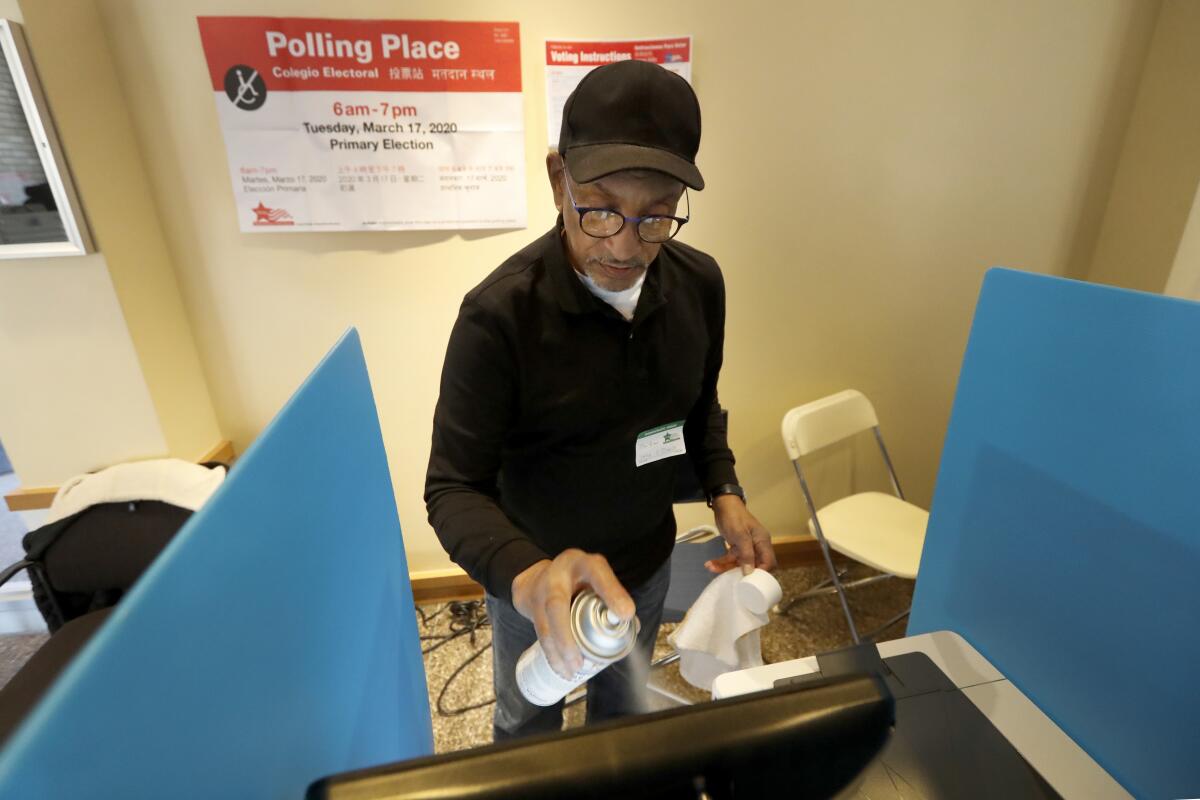Could Trump delay the November election? Not without risking forfeit to a Democrat

- Share via
WASHINGTON — Voters are unnerved. Confusion is growing throughout the country as the coronavirus outbreak moves states to postpone primaries and change voting procedures in the midst of a presidential election year. It is all leading to a lot of speculation — sometimes uninformed — about what could happen in November if this virus is still spreading.
Are there any guarantees the election will actually happen if congregating in public places, like polling stations, is still a risk come fall? Can voters be confident President Trump can’t exploit this crisis to avoid facing them if he fears defeat?
The short answer is yes. While government officials have the authority to reschedule voting for the parties’ primaries, that flexibility does not exist for the general election. It is all but certain to happen as planned. The question is whether states reeling from the pandemic will be prepared to accommodate everyone who wants to cast ballots.
Here are some fuller answers to key questions about it all:
Can Trump use the national emergency to delay the election?
No. The president does not have that power. Legal scholars are widely in agreement on this point, as are both Republican and Democratic election officials. The nonpartisan Congressional Research Service reached the same conclusion when it investigated the question in the aftermath of 9/11.
Under the U.S. Constitution, Trump and Vice President Mike Pence cannot stay in office past their four-year terms without being reelected. If the election does not happen for any reason, constitutional rules of succession kick in.
That could mean a lawmaker down the line of succession who is not up for reelection could be the new president. That person very well could be a Democrat, and installing a the Democrat in the White House is not an outcome Trump or any partisan Republican seeks.
“The 20th Amendment says if we have not chosen a president by a certain date, it goes to succession,” said Rick Hasen, an election law scholar at UC Irvine. “It’s not like a delay would keep Trump in office longer.
So the presidential election happens Nov. 3, no matter what?
Very likely, but not absolutely. In an extreme emergency Congress could put it off for a few weeks. A 1948 law is very specific about the election date: “the Tuesday next after the first Monday in November, in every fourth year succeeding every election of a President and Vice President.”
Lawmakers could change that, just not by very much. If they push the date out too far, they quickly run afoul of the Constitution.
Why can these states delay primary voting?
Georgia, Kentucky, Louisiana and Maryland have delayed voting in party primaries more than a month amid coronavirus concerns. Ohio, which was to vote on Tuesday, did the same on the eve of the election, despite a judge’s order that polls should open; state public health officials declared gathering in polling places unsafe and the governor sided with them.
The moves are unsettling to voters but not unprecedented. New York passed emergency legislation to postpone a local primary election being held on Sept. 11, 2001, and disrupted by the terrorist attacks. Florida delayed some local elections interrupted by Hurricane Irma in 2017.
State officials have flexibility to delay election-day voting in primary elections. They do not have the authority to reschedule a federal general election. “It’s important to remember the distinction between primary and general elections,” Edward B. Foley, director of the election law program at Ohio State University, wrote on Twitter. “There is no equivalent power in the states to change the date of the general election for Congress or the presidency.”
So what happens if it’s not safe to go to the polls on Nov. 3?
This is a big issue, which election officials and activists are wrestling with now. States, not the federal government, generally set their own election laws and that has left some states in a much better position than others. States including California are well positioned because they permit “no excuse” absentee voting. All voters are welcome to cast their ballots by mail or at drop-off locations.
In at least 13 states, voters must provide an excuse, such as a medical condition. Those states are being encouraged to quickly lift their restrictions on absentee-voting. A bill in the U.S. Senate would require them to do so while the public health crisis persists, but it is unclear if it will pass. State lawmakers are also mulling action.
The clock is ticking fast. Lawmakers are abandoning state capitols to take refuge from the outbreak, and election officials are warning them not to wait until the fall to act. There are all manner of logistical issues involved in expanding vote-by-mail operations, and election officials would need time to get ready.,
“There is very little time to move things” in state legislatures, said Jeanette Senecal, a senior official at the League of Women Voters of the United States. “We want to make sure all voters have access to the ballot box and everyone’s civil rights are protected.”
More to Read
Get the L.A. Times Politics newsletter
Deeply reported insights into legislation, politics and policy from Sacramento, Washington and beyond. In your inbox three times per week.
You may occasionally receive promotional content from the Los Angeles Times.











